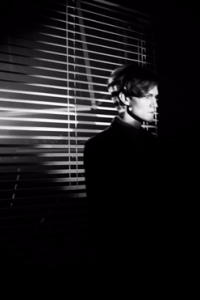
My writer died exactly thirty years ago. He was the nicest man in the town, always game to help anyone in need.
That he died was a matter of pity.
His death was mourned by one and all, from close friends to acquaintances to strangers.
Before he left, he handed me over to his son, told him to take charge of me and voiced his desire of seeing me on the silver screen.
“It’s my most precious work till date and I really wish I could live long enough to see it release,” he rued.
“I promise to you that a few years down the line, I will make sure that this film gets launched the way you want it to be,” his son reassured him.
“Thank you, Rahul. This film belongs to you from today. Now that I know it’s in safe hands, I can die peacefully.”
It has been thirty years and I continue to lie on Rahul’s dust covered shelf. It’s surprising he doesn’t contemplate throwing me away. Maybe that’s because of the promise he had made to his father thirty years ago.
Each time he visits me, he looks at me longingly, perhaps in a hope that someday I would get the release that his father desired for me thirty years ago.
But he is jolted back to reality the minute his phone beeps, as he is reminded of the various projects he has in pipeline and how I, out of all them, should be his last priority.
“I am on my way Mukesh,” he tells his secretary as he picks up a few folders from his desk and manages one last glance at me before he leaves the room, and in the next fleeting second, perhaps having suddenly changed in his mind, shuffles me into one of his folders, and gets into his luxury car.
“Lights! Camera! Action!” shouts Bhuvan, a new director, after giving cues to his lead actors. He joined Keerti Productions, Rahul’s father, Mr. Sahai’s production house, over three years ago and is finally getting to direct his first film.
“All the extras are requested to stay away. We’re doing a close up of just the leads, please,” announced Sharman, the assistant director.
“Role toh lead actors ka hota hai, hum toh bas background mein khade hote hain, jab marzi bula lo, jab marzi hata do (It is the lead actors who matter, we insubstantial extras can be dispensed with, at any given point of time),” mouth the extras to one another, remorsefully.
Anand and Sukriti, the lead actors, appear in front of the camera the next instant. The fans are switched on, and Sukriti’s scarf is made to fly from one corner of the set to the other, and the theme track is played in the background.
“Where are the rains?” screams Bhuvan.
“Sir, monsoons are still a month away,” replies an assistant director, clearly a novice.
“I know that, you idiot! I am talking about the shower pipes that would have helped us create artificial rain which you forgot to bring today. Do you really expect us to stall our film and wait here till the monsoons arrive?”
“I am sorry, sir,” he replies, embarrassed.
Rahul enters the set.
“What happened, Bhuvan?” he asks him, casually.
“Mazaa nahi aa raha sir. (We are not satisfied with the shots, sir.) I have done this sequence multiple times, but I still don’t quite feel like it’s shaping up right.”
The lead actors look perplexed. Sukriti barges into her make-up van for the third time. Sharman shifts uncomfortably in his place.
“Do you want to discontinue this film?” Rahul asks him rather nonchalantly, to Bhuvan’s surprise.
“Why, sir? It’s a script that I have worked on for five years,” Bhuvan says.
“I am not telling you to discard the film. We could make it after a few years,” he says.
“Sir…but…”
“I have a rather interesting script for you. Meet me tomorrow in the office at 11:30 in the morning, positively. Plus this script is not working out anyway, right?”
“Okay, sir,” Bhuvan replies.
“Room Number 350 is the best script that my father has ever written. It’s a huge responsibility. Also, it’s a period film. The reason I didn’t make it in the early 1990s was because it wouldn’t have fared well commercially back then. Period films are back in fashion now. Almost everyone is making a period film these days, and top actors and actresses are dying to star in period films. The odds are in our favour. Do you follow me?”
“Yes sir,” nods Bhuvan. He reached Rahul’s office at exactly 11:30 the next morning. He seems genuinely interested in the script.
“Good. So it’s set in the early 1960s. Now I am sure you’ve heard of ghost writers. The protagonist of our film is a ghost writer who religiously works for this man called Vishal. Vishal and he share a great bond, until one day, Vishal’s book Room Number 350, which is a murder mystery revolving around the death of an artist in his hotel room, gets framed for being a plagiarised piece of work. Now it is very important to know the back story before we proceed any further with the film…The artist in Room Number 350 dies because of coffee poisoning. It’s revealed later in the book that he kills himself after being unable to rationalise the guilt of having burned down a friend’s manuscript…who he thought was a rival.”
“This was the story of the book. Now coming back to the script, Vishal fires Arun, his ghost writer, and tells him to never meet him again. But Arun being the loyal man that he is, takes upon himself the accusations of plagiarism, thereby helping Vishal escape the whole scenario. Nevertheless, this does nothing to improve their relationship. The rest of the film is about how Arun redeems himself and his master, the sacrifices that he makes for him and how he prevents Room Number 350 from falling into wrong hands.”
“The reason it was close to my father’s heart was because of the various things it talks about in its sub-plots. For instance, my father had worked for this producer called Mr Bandhopadhyaya for so many years, until one day when he decided to fire him. The pain that Arun feels upon being disowned by a man who he thought would be with him through thick and thin bases itself upon my father’s personal experiences. Also, he was accused of plagiarism when he was working on his first script. Coincidentally, the room number of the hotel that he stayed in while working on the script was also 350. Maybe that’s where he got the title for the film from.”
“It’s almost my father’s life and Bhuvan, I am entrusting you with what’s probably the closest thing to my heart. This is the only copy of the script. We don’t have it anywhere else. If it gets made, it will be a very, very special moment for all of us. So you’ll live up to it, won’t you?”
“Yes sir,” Bhuvan says, even though he looks slightly anxious.
“Don’t be afraid. Don’t take too much pressure. Just make it with your heart. Remember, what originates from the heart, touches hearts.”
“Yes, sir.”
I wake up to the sound of reporters announcing in ecstatic voices how Mr. Sahai’s best work is finally being adapted into a film on the television.
“Everyone is very pleased with the news,” says Rahul to a bunch of reporters.
“I have finally given the script a go-ahead after so many years. Like they say, every script has its time and fate. The time has come for this script to be adapted into a film. And we are all very happy.”
The mahurat shot is taken the following day. It turns out well.
Rahul smiles and hugs Bhuvan.
“Cut!” shouts Bhuvan, satisfied with the last shot for the day.
He shoves me into his bag after we were done for the day.
It feels a bit alien to be in someone else’s bag, especially after having been in Mr. Sahai’s house for such a long time. But I guess I will have to get used to it. Everything comes with a price.
I am finally being made into a film, after all, I remind myself.
“So, what are you working on?” asks Parmesh, a friend of Bhuvan’s on the phone, once he reaches home.
“A script given to me by Rahul sir,” he replies, casually.
“What? You aren’t working on your film?”
“Rahul sir said I need to work on this first,” he says, disheartened.
I am shocked to learn that he isn’t interested…in directing me.
“How dare he do that to you? I mean…just because he is the producer doesn’t mean he can order you about the way he wants. You’ll work on the script that you want to.”
“I wish Parmesh…”
“Convince him, somehow.”
“I can’t…it’s a script that’s very, very close to his heart. He won’t listen to me. But there’s one thing…”
“What?” asks Parmesh, curious to know.
“Rahul sir gave the only copy of the script to me. It’s nowhere else. If I discard this copy…the story will be gone for good.”
“Eureka!” shouted Parmesh.
My heart stopped beating for a second. I was the only copy indeed…if they destroyed me…there was no way I could be reproduced. No one even knew the exact story with all the details. Not even Rahul.
“Burn it! Tell him you did it accidentally! How would he come to know?”
“But…that’s so unethical…”
“Isn’t having your film stalled just because he wants to make his father’s film unethical?”
“Yes but…okay…” Bhuvan finally agrees. “Bye.”
I quiver as he places me on the table and strikes the matches.
I am set on fire the next instant. The flames soon spread, killing me slowly.
It feels excruciating.
I scream.
But no one can hear me, of course.
I can do nothing about it.
I just watch myself burn out, slowly, and along with me, the wishes of Mr Sahai of seeing me on the silver screen char too.
I feel helpless. Why do people always resort to killing, I think to myself. He could have politely confronted Rahul about this. Maybe he would have given in, after some point. Why did he have to burn me? I cry. And cry. And cry.
Dizziness sets in, eventually.
“Wake up! Wake up!” a voice beckons me.
“Wake up!”
But it’s too late.
My soul wakes up to Mr. Sahai’s voice.
“Wake up! You’re my creation You’re my writing!” he screams.
“I am in your world now, sir. I am in the world of the dead,” I tell him, softly.
“No. You can’t let yourself go like that,” he repeats, furiously.
“It’s too late now, sir.”
“I know, I know. I watched you burn. I couldn’t save you, I couldn’t…” he breaks down.
I can’t stand his tears.
“He shall be avenged for his wrongs, Mr. Sahai, you wait and watch,” I tell him in an impulse.
“But how? You’re dead.”
“I am, physically. But I remember my story. The story of Room Number 350 shall be recreated, Mr Sahai. That’s the only thing I can do. The only way I can seek revenge. Because I own that story, and I can recreate it the way I want to.”
“But how are you going to go about it?”
“I am going to make the story of Room Number 350 come to life. Remember the artist who drowned himself in guilt because he destroyed a friend’s manuscript? That shall happen to Bhuvan and his friend. That’s the only thing I can do. Make the script come to life to take revenge.”
“Don’t be so harsh…”
“They killed me, Mr. Sahai. They killed your dreams. There’s no other way.”
Bhuvan wakes up the following morning with a thundering headache. He gets up nevertheless, ready to face Rahul.
“Rahul…I…” he stutters as he tries to say something. And in a sudden involuntary action, starts to cry.
Thanks to me, of course.
“What happened?”
“I burnt your father’s script, Rahul! I burnt your father’s script!” he yelps, unable to control his tongue.
“What?” shouts Rahul in shock.
“I am a bad man…I killed your father’s dream just because you didn’t let me direct my script…”
“You burnt it? You burnt the only copy of my father’s most precious script?” repeats Rahul in shock.
“Yes. I did,” Bhuvan says.
There’s silence in the air for a while.
“Go away,” says Rahul, in a decisive tone.
“Sir…”
“Go away, I said,” he repeats, aggressively this time.
“Sir…”
“Do you want me to take you by the collar and push you out? I’ve lost faith in you. Don’t ever meet me, again. I don’t want to see your face for the rest of my life. Go.”
Bhuvan makes his way back home with a heavy heart. “Why did I tell him the truth?” he questions himself, unable to understand.
He decides to call up Parmesh to confide in him his woes.
“Hello? Parmesh?”
“Who’s this?”
“I am Bhuvan, his friend. May I speak to Parmesh?”
“Parmesh had a heart attack last night. He’s in the ICU. I am his sister.”
Bhuvan was numbed on hearing this. He didn’t know what to say and threw the phone away.
“I can’t take this anymore…I don’t know why this is happening to me… I just…I never thought I’d feel this penitent about what I did...” he squeals loudly and bursts into tears.
He cries for an hour relentlessly.
And then he sits up, and looks at his watch.
He gets up decisively the next moment, marches to his kitchen and retrieves from one of the shelves a small emerald-coloured bottle of poison.
“Please forgive me for my sins,” he prays for one last time before he closes his eyes and sheds a tear.
With shivering hands, he consumes the bottle.
Life seeps out of him, slowly.
The way it seeped out of me.
He just watches himself go away, helplessly, like I did too.
Even though I feel bad, I don’t feel as bad as I should about doing what I am, when the memories of my own death, come back to me.
Killing him softly, I mouth to myself.
I have taken my revenge.
I feel slightly better. I smile to myself.
I need to help Mr. Sahai through depression now, though.
So what if I couldn’t be adapted into a film.
I happened to someone.
And that’s way more impactful than a film could ever have been.
At times, one must never undermine the strength of stories or hurt them.
You never know which one may ring true and bring itself to life.
And I am saying this out of experience.
About the Author







Comments